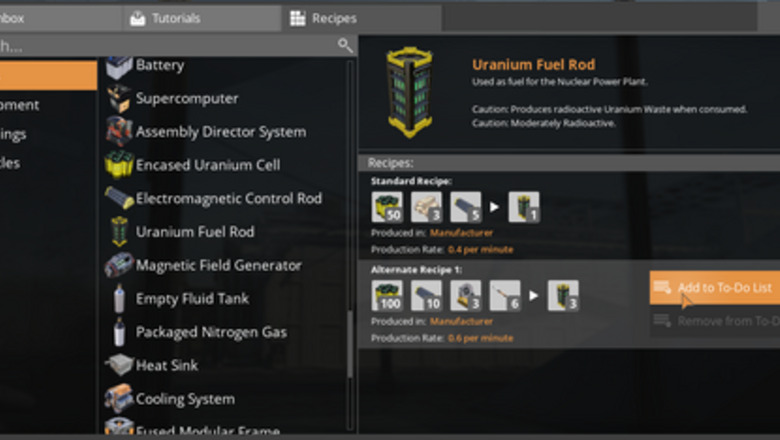
views
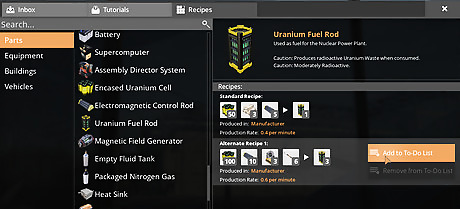
Get ready. Start by unlocking the alternative recipe for Uranium Fuel Rods, since it is more efficient. So, find some Hard Drives to research if you don’t already have it unlocked. You probably don’t have a lot of power to spare, so you should place a lot of batteries for power storage. Don’t worry about making them look nice, since they are just to ensure that you have enough power to get your fuel rod production started. They will be charging while you make your nuclear set up.
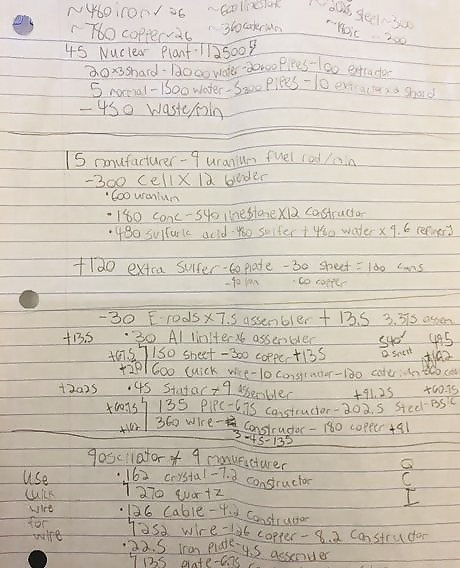
Do the math. The maximum amount of uranium you can get from a normal node is 600/min. That much is plenty, so calculate the maximum amount of Uranium Fuel Rods you can make from that: 600 uranium can make 300 Encased Uranium Cells, which can make 9 Uranium Fuel Rods. Which also needs 30 Electromagnetic Control Rods, 9 Crystal Oscillators, and 18 Beacons. 9 Uranium Fuel Rods/min fuels 45 Nuclear Power Plants, which needs 13,500 water/min and makes 450 Uranium Waste/min. Then, work backwards from each final ingredient and calculate the raw materials, basic parts, and machines needed. Doing the math before you build saves a lot of trouble as you build. The Satisfactory Wiki is great for seeing recipes and production rates of products. You could also use the Production Planner on the Satisfactory Calculator website to do the math for you! Although, having it on paper makes for a convenient reference while playing the game.
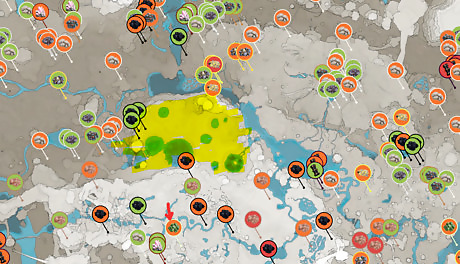
Find a location. When finding a location to build your Nuclear Factory, look for a relatively flat area that’s near one of the Normal Uranium Nodes. You should also try to make sure it's near lots of water, and other resource nodes that aren’t too common like Sulfur, Caterium, and Quartz. A perfect spot for this is the crater lake near the middle-left of the map (highlighted yellow). The closest uranium node is south of the lake (red arrow) and is also near 2 Pure Quartz Nodes. You don’t have to use this exact location. You can find one better suited for you by using the Interactive Map on the Satisfactory Calculator website.
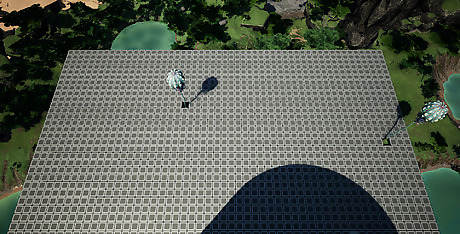
Gather materials and prepare a foundation. Now, you’re ready to start building. Gather all the materials you need and make your way to the location you chose. You can add buildings to your “to do list” to see exactly what and how many materials you need. *Before you make any buildings, start with a large flat foundation. This makes connecting buildings a lot easier and reduces the amount of foliage you need to clear.
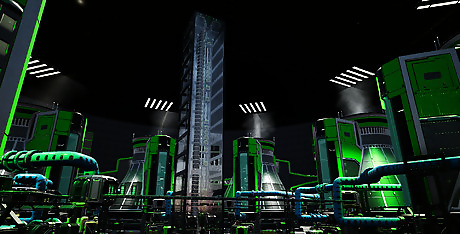
Make your nuclear power plants. Working backwards form your production line is easier, so you should start with the main building. Since this is also the only time you get to build nuclear plants, you should spend your time making it as aesthetically pleasing as possible. (If you care about that stuff). If you use the overflow method (1 input belt with a splitter for every building) for the fuel rod input, be aware that it will take an extremely long time to completely fill every power plant. So you won’t be at full power capacity for a while. NOTE: 45 nuclear plants will take a lot of space, so you should use as many power shards as possible. If you want to save the most space, it will take 66 power shards (22 at 200% plus 1 at 100% = 45 Plants). Nuclear plants scale differently than other buildings. For them to function at 200%, you’ll need 3 power shards instead of 2. This also means you’ll need to use Mk.2 pipes for each power plant since the required water for each goes from 300/min to 600/min
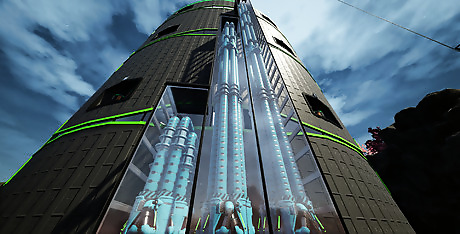
Place water extractors and pipes. This part is often the most tedious and can lead to a lot of problems if you aren’t careful. If you overclock your nuclear plants, you will need 5 extractors per nuclear plant, or 2 fully overclocked extractors. Pipes can sometimes be unreliable. Water can get stuck because a pump isn’t perfectly placed, pipes may not be connected even if they appear to be, and can even be affected by your PC's specs. Build your extractors as close as possible to your nuclear plants, keep them organized, and don’t be afraid to put too many pipeline pumps. You should check your Nuclear Plants water supply after you turn on the power. There’s a good chance at least one of your pipes may have a problem.
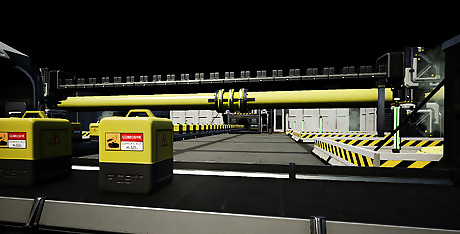
Start your uranium fuel rod production. Now that you finished the main building, it’s time to move on to making your fuel rod production line. You should start by making the manufacturers for the fuel rods and work backwards from there. Although you should have plenty of experience making these types of factories by now after reaching tier 8, Encased Uranium Cells take some extra work. This is going to be one of the most radioactive areas of your factory since it’s processing the uranium ore. You should do your best to keep the uranium conveyor belt away from areas you will often visit, especially if you don’t have a lot of radioactive filters available. Another thing to note for Encased Uranium Cells is that they produce excess sulfuric acid. The best way to handle this is to produce empty canisters on the side and use packagers to send it to the resource sink. If you have any hard drives left over, you should try to unlock the steel or coated iron alternate recipes since dealing with oil and plastic can be more trouble. After that, it’s up to you to decide how you want to separate the rest of your factory.
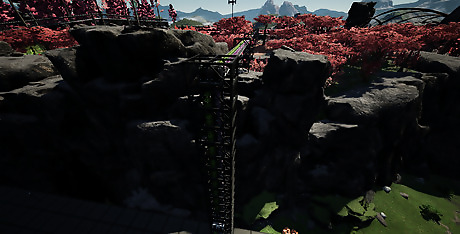
Input raw materials. Finally, it’s time to carry all the raw resources to your factory. It’s difficult to make miles of conveyor belts look good, so don’t worry too much about the appearance. A cheap way to make a decent conveyor highway is to just use frame foundations as seen in the image. It’s also a good idea to power your uranium miner after you make the belt and hide the uranium deep underneath your main foundation to avoid taking radiation damage.
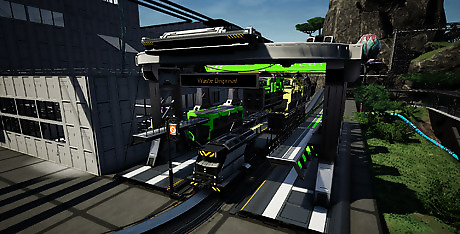
Transport uranium waste. If you don’t deal with your waste, it will clog the nuclear plants and you will lose power. Disposing of waste is a separate process and takes even more resources, so it’s a good idea to move it somewhere else available nodes. You could make an extremely long conveyor belt, but this is a good opportunity to use a train. Setup a train station to load the waste. Since you are already close to some uncommon resources, you could also transport extra sulfur, coal, and quartz.
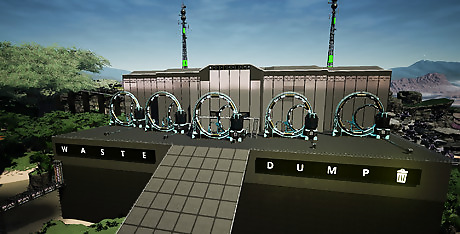
Repeat Steps 1-4. Repeat steps 1-4 but instead, this time you’re preparing to make plutonium fuel rods. Decide which recipe is easiest for you, do the math, and find a location. Make the unload train station at the location you chose. Like the nuclear power plants, this is one of the few times you get to use the particle accelerator, so make them look good. The waste is used in plutonium pellets and non-fissile uranium. Non-fissile uranium, like the encased uranium cells, produces excess water and needs to be disposed of. The best way to get rid of excess water is to use any of the water + ore alternate recipes. The most efficient recipe is wet concrete, and then you can just send the concrete into the resource sink. The rest of the parts for plutonium rods are pretty simple, and you should have plenty of experience making them by now.
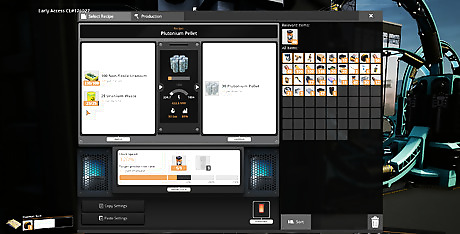
Overclock everything. This is the only time in the game where you would want to see machines not at full efficiency. You should fill the machines that handle uranium waste with power shards and essentially try to produce more than you can. The reason for this is to ensure that your waste disposal never clogs or gets too full. If your machines look like the one in the image, then you shouldn’t have to worry about your conveyor belts getting clogged
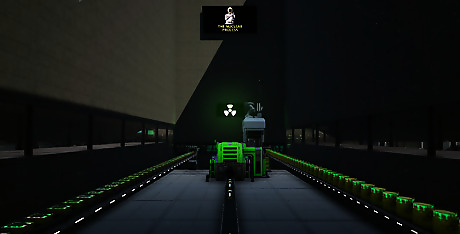
Use your plutonium fuel rods. You’re free to use the plutonium fuel rods as you see fit. If you never want to worry about your power shutting down, just send them to the resource sink. If you don’t mind making a massive storage, you could also make more nuclear power plants and use the plutonium as fuel. This will make plutonium waste (at a slower rate than uranium waste) and eventually fill your storage. You have now successfully set up nuclear power and can make even bigger factories with your unlimited power!




















Comments
0 comment